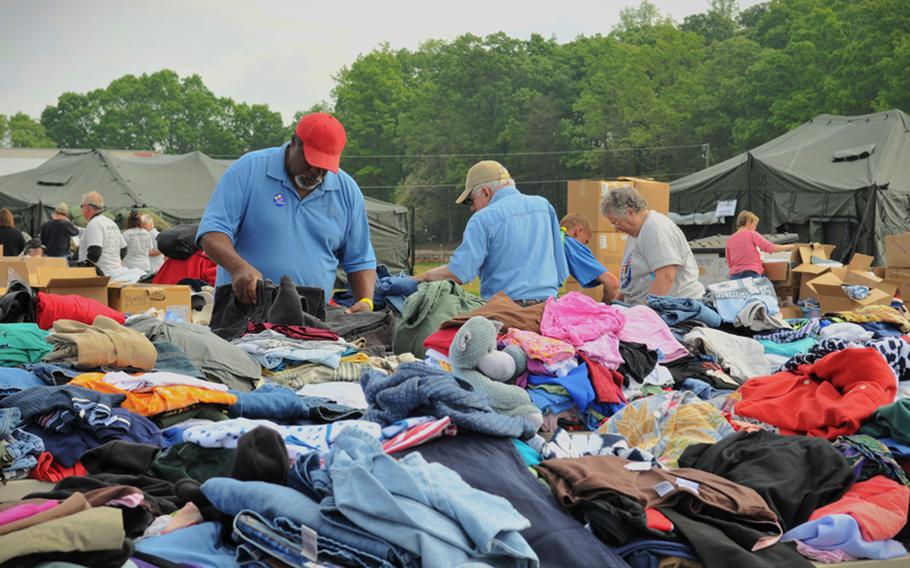Migration
Number of homeless vets drops, but VA goal might be out of reach
Stars and Stripes November 21, 2013

A veteran sorts through donated clothes during the Department of Veterans Affairs' Annual Stand Down Against Homelessness at the Hickory Legion Fairgrounds in Hickory, N.C., on April 2012. (Brian Christiansen/U.S. Air Force)
WASHINGTON -- Efforts to end veterans homelessness have helped nearly 20,000 impoverished people off the streets in the last four years, a figure that government officials call impressive progress given the shaky U.S. economy.
But some housing advocates say that progress won’t be enough to meet VA’s self-stated deadline to end veterans homelessness over the next two years, especially as veterans of the recent wars struggle with unemployment and mental health issues.
“We may have to re-examine what success is,” said John Driscoll, president of the National Coalition for Homeless Veterans.
“Programs are headed in the right direction. But we’re only beginning to see what the real demand for services will be for the younger veterans. I think 2015 was an ambitious goal … and we may need to recalibrate how long we’ll be in that rescue mission.”
According to the Department of Housing and Urban Development annual point-in-time count released Thursday, the number of homeless veterans across the country dropped to 57,849 in January 2013.
That’s down about 5,000 people from the 2012 count and almost 25 percent from the count of 76,329 in 2010, the first conducted after officials announced their campaign to end veterans homelessness.
Earlier this month, Veterans Affairs Secretary Eric Shinseki said his department remains focused on the 2015 deadline as a realistic and reachable goal.
He also noted that when officials made that promise in late 2009, they had anticipated a faster economic recovery and stronger job growth. Shinseki said reducing the number of veterans living on the streets in light of that adversity is “a remarkable reversal of what is traditionally the trend line.”
Even with the progress, the department remains far off pace to eliminate veterans homelessness in the next 25 months.
The National Coalition for Homeless Veterans is hosting a summit in Chicago this week on veterans access to housing. On the agenda is “the remaining housing challenges” in VA’s plan to end veterans homelessness, including surveying shelter beds and low-income housing options in major cities.
Driscoll said the 2015 goal has helped focus efforts among housing advocates, making it laudable even if it might not be achievable.
Beth Sandor, director of quality improvement for the 100,000 Homes Campaign, said officials there haven’t given up on the deadline yet.
“We’re seeing communities that in just the last 100 days have doubled and tripled their outreach programs, getting help for even the most difficult chronically homeless,” she said. “So we still believe that 2015 is absolutely possible.”
Housing and Urban Development’s point-in-time count is designed to give a snapshot of the number of homeless people -- veteran and non-veteran -- across the country on a given night. Outside estimates have noted the number of people who find themselves temporarily homeless for at least part of the year could be as much as three times higher.
VA spent about $1.3 billion on homeless programs in fiscal 2013, including expanding the number of grants and subsidies to outside organizations combating the problem. Officials have asked for an increase of about $100 million in homelessness program funding for fiscal 2014, but that budget request is languishing in Congress.
Last week, the department graduated its first class from a new National Cemetery Administration apprenticeship program focused on employing homeless veterans. The program was launched in late 2011 as part of the initiative to end homelessness, and has provided a path to stable employment for 37 veterans.
Michael Cobb, an Army National Guard veteran who left the service in 2012, said before he enrolled in the apprenticeship program, he had been jumping between odd jobs and living on his cousin’s couch.
“It was an opportunity and a wake-up call for me,” said Cobb, who works at VA’s national cemetery in Mountain Home, Tenn. “If it hadn’t been for this program, I’d probably still be on that couch, or somewhere worse.
“But now I’m in my own place. And nobody can kick me out of my own place.”
shane.leo@stripes.com Twitter: @LeoShane